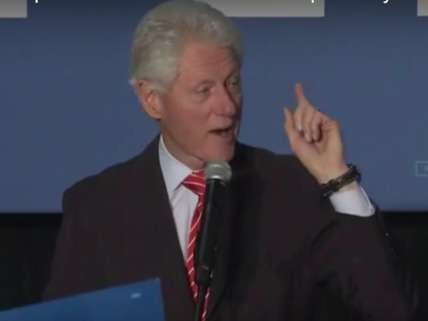Bill Clinton's Mendacious Defense of the 1994 Crime Bill
The former president says Republicans made him support longer sentences, which were a necessary response to 13-year-old murderers "hopped up on crack."

While arguing with Black Lives Matter protesters during a speech in Philadelphia yesterday, Bill Clinton made several eyebrow-raising claims about the 1994 crime bill that he signed and his wife supported:
Democrats included longer prison sentences in the bill only because Republicans demanded them. According to Clinton, Joe Biden, who was the bill's main sponsor in the Senate, said, "You can't pass this bill, and the Republicans will kill it, if you don't put more sentencing in." Yet as first lady, Hillary Clinton cited tougher sentencing rules as one of the bill's main advantages. "We need more and tougher prison sentences for repeat offenders," she said in a 1994 speech. "The 'three strikes and you're out' for violent offenders has to be part of the plan. We need more prisons to keep violent offenders for as long as it takes to keep them off the streets." After the bill passed, the Clinton administration bragged about making sentences longer.
The 1994 bill caused historic declines in violent crime. "Because of that bill, we had a 25-year low in crime, a 30-year low in the murder rate," Clinton said. "Because of that and the background check law, we had a 46-year low in the deaths of people by gun violence." It's true that violent crime has declined steadily since the early 1990s, and so have gun homicides. But that downard trend began before the 1994 crime bill took effect. While incapacitation of violent criminals played some role in that decline, the federal system accounts for a small share of the prison population, as Clinton emphasized yesterday. And to the extent that the 1994 law encouraged states to be more punitive, Clinton conceded in a 2015 interview with CNN, "we cast too wide a net and we had too many people in prison," contributing to the "mass incarceration" his wife now decries. Clinton's claim about the impact of the Brady Law, which required background checks for people who buy guns from federally licensed dealers, is even more dubious.
Crack-related homicides are committed under the influence of crack. "I don't know how you would characterize the gang leaders who got 13-year-old kids hopped up on crack and sent them out onto the street to murder other African-American children," he told protesters. "Maybe you thought they were good citizens. She didn't." Contrary to the picture Clinton draws, so-called crack-related homicides are not caused by stimulant-fueled aggression. A 1997 analysis of "crack-related" homicides in New York City found that 85 percent were "systemic," meaning they grew out of black-market disputes. About 7 percent occurred during crimes committed to support a crack habit. Only one homicide out of 118 involved a perpetrator who was high on crack. In other words, the vast majority of the violence that Clinton says motivated the 1994 crime bill is a predictable consequence of the prohibition policy he and his wife continue to support.